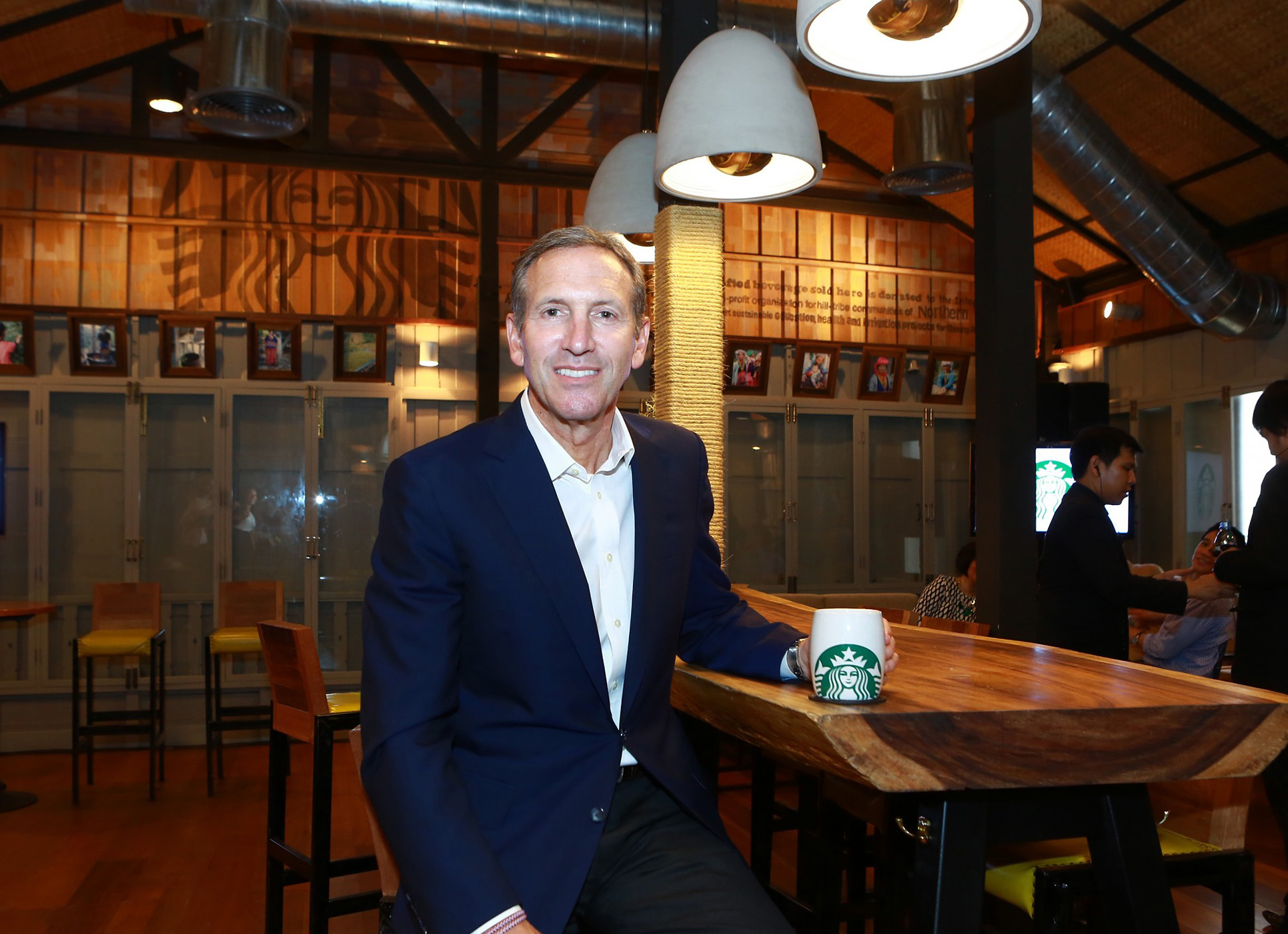
Starbucks CEO Howard Schultz has never shied away from involving his company in controversial debates, whether those debates are about same-sex marriage, or gun control, or U.S. government gridlock.
But the executive, who oversees a coffee empire with 4,700 U.S. stores, has now taken on arguably the most polarizing political debate in the United States: race relations.
Starbucks published a full page ad in the New York Times on Sunday — a stark, black, page with a tiny caption “Shall We Overcome?” in the middle, and the words “RaceTogether” with the company logo, on the bottom right. The ad, along with a similar one on Monday in USA Today, is part of an initiative launched this week by the coffee store chain to stimulate conversation and debate about the race in America by getting employees to engage with customers about the perennially hot button subject.
Beginning on Monday, Starbucks baristas will have the option as they serve customers to hand cups on which they’ve handwritten the words “Race Together” and start a discussion about race. This Friday, each copy of USA Today — which has a daily print circulation of almost 2 million and is a partner of Starbucks in this initiative — will have the first of a series of insert with information about race relations, including a variety of perspectives on race. Starbucks coffee shops will also stock the insert.
In a video addressing Starbucks’ nearly 200,000 workers, 40% of whom are members of a racial minority, Schultz dismissed the notion that race was too hot a topic business-wise for Starbucks to tackle.
“I reject that. I reject that completely,” he said in the video address. “It’s an emotional issue. But it is so vitally important to the country,” he continued, pointing to that the United States is “so much better” than what the current state of race relations portray it to be.
The initiative follows several months of consultations with employees that started in December, in part as a result of protests that roiled several U.S. cities after grand juries declined to indict white police officers in the killings of 18-year-old Michael Brown in Ferguson, Mo., near St. Louis, and 43-year-old Eric Garner in Staten Island, N.Y.
Schultz has met with almost 2,000 Starbucks employees since then in cities hit most directly by racial tension and anti-police brutality protests in the last year, including Oakland, St. Louis, Los Angeles, New York, Chicago, and Seattle, where Starbucks is based. Cognizant of what a powder keg the issue of race is, Starbucks says its baristas will be under no obligation to engage with customers on the topic. The goal is simply to foster discussion and an exchange of ideas.
The potential exists for arguments to break out (not for nothing this topic is the third rail of U.S. politics), and some may fairly question any move that could potentially slow in-store service. But Schultz has never been a wallflower when it comes to political debates and social activism. In 2013, he led a petition-based push urging Washington politicians to end the federal government shutdown. That year, he also wrote an open letter asking gun owners to refrain from bringing their guns into stores even they were allowed. Two years earlier, Starbucks launched a fund, fueled by the sale of $5 bracelets, to spur U.S. job creation. The company has also pledged to hire 10,000 veterans and military spouses over a five-year period.
And he has also not been shy to slam critics of Starbucks’ or his political stances, including shareholders. Two years ago, after an investor at its annual shareholder meeting said the company’s support for a marriage equality bill in Washington state had hurt sales after a boycott by an advocacy group, Schultz invited him to sell his Starbucks shares if he felt he could find another stock with as a high a return rate.
Schulz will discuss Starbucks’ “Race Together” initiative at the company’s annual shareholder meeting on Wednesday.
This article originally appeared on Fortune.com
Read next: The SAE Scandal Is Another Example of Plummeting Tolerance for Bigots
More Must-Reads from TIME
- Donald Trump Is TIME's 2024 Person of the Year
- Why We Chose Trump as Person of the Year
- Is Intermittent Fasting Good or Bad for You?
- The 100 Must-Read Books of 2024
- The 20 Best Christmas TV Episodes
- Column: If Optimism Feels Ridiculous Now, Try Hope
- The Future of Climate Action Is Trade Policy
- Merle Bombardieri Is Helping People Make the Baby Decision
Contact us at letters@time.com